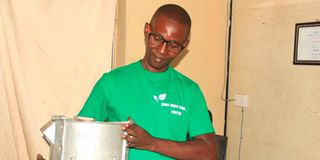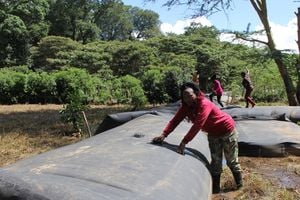Turkana-based start-up capitalises on providing clean energy solutions

Brian Onyango, the founder of Usafi Green Energy. Pool
What you need to know:
- The business has sold over 12,000 efficient cooking stoves and supplied more than 80 tonnes of briquettes.
- The Usafi Silver Bora brand of jikos cost between Sh300 to Sh600,000, depending on size.
Majority of African homes use firewood and charcoal, considered cheaper fuel options in spite of the harmful smoke emitted by wood and charcoal that is burned in traditional jikos and open fires, claiming four million lives every year around the world in the process.
The timber required to make the millions of tonnes of charcoal that Kenya consumes each year has led to mass deforestation, a loss of 310,000 hectares between 2000-2017.
It is this knowledge that inspired Brian Onyango, 26, to start his company, Usafi Green Energy Limited in 2020, a startup company based in Turkana, which turns waste into energy.
The business, for instance, salvages disposed drums by road contractors and factories and use them to manufacture clean jikos. They also turn the invasive prosopis tree into briquettes.
Early 2018, Onyango resigned from a well-paying job as a marketing and production manager to pursue a career in the renewable energy space as a consultant.
“After three consultancy offers between 2018 and 2019, I was able to raise a capital of Sh700,000, with which I used to establish my company. The idea came about when I was on duty at the Kakuma Refugee Camp where there was a big gap in access to cooking energy. Those at the camp used the three stone cooking model, which uses firewood, exposing women and children to respiratory illnesses,” says Onyango, who has Bachelor’s degree in Renewable Energy from Jaramogi Oginga Odinga University.
“Kakuma is home to over 250,000 people. The host and refugee communities rely primarily on inefficient cooking practices such as open fires and basic firewood and charcoal stoves, leading to high fuel expenses, health issues and environmental degradation,” he adds.
He further notes that the invasive prosopis trees remains a threat, killing livestock and preventing any farming activities in this area.

Brian Onyango is the founder of Usafi Green Energy. He is holding one of the stoves his social enterprise produces, which is made from disposed drums.
“It has encroached on over 35,000 hectares of land extended to five Northern counties in Kenya, specifically in Turkana County. We source our raw materials locally, and provide employment for locals, who cut down the trees and deliver them at our production site for briquetting.
We have also have signed contracts with over 200 business vendors both located in refugee camp and host communities in Kakuma, as our distributors and Point of Sales.”
So far, the business has sold over 12,000 efficient cooking stoves and supplied more than 80 tonnes of briquettes to households, schools and factories that have boilers.
For the jikos, they use local soil for the lining, while the outer cladding is made using waste drums salvaged from road construction sites. Once assembled, they are then painted, labelled and dispatched to the market.
“To make the briquettes, we source and harvest the invasive prosopis tree from the community then crush them, carbonise the product to remove excess Carbon Dioxide, mix it with a binder and finally, compress with the briquette machines, after which it is ready for sale,” he explains, adding that they have an online digital tracking and repayment model where vendors and clients can pay and order their products online or via pop up SMS.
In 2021, the business made a cumulative turnover of Sh8 million, having made Sh5 million in 2020 .
“So far, we have manufactured over 15,000 stoves and installed over 15 larger stove to institutions such as schools and hospitals, with Kakuma Mission Hospital and Kakuma Girls Primary School being some of clients.”
The briquettes retail at Sh60 a kilo while the Usafi Silver Bora cook stoves, depending on size, retail between Sh300 to Sh800. Higher tier stoves range between Sh2,500 to Sh5,500. Social institutions stoves with a 50-liter to 600-liter capacity ranges from Sh80,000 to Sh600,000 depending with the size required.

The jikos are made using soil and aluminium drums sourced from road construction sites.
The company has a work force of 25, some refugees, spread between production and marketing departments.
Approved by the Kenya Bureau of Standards, Usafi Green Energy products can be accessed from the company’s website and through their distributors and a few supermarkets. They also do door-to-door delivery services after order placement.
“As any other business, our main challenge is lack of enough capital to scale up our production to meet the demand. Skilled labour is also a challenge, so is access to modern equipment, which will enable us double our production output,” explains Onyango.
Besides the production arm of the business, the start-up conducts civil education on environmental conservation and capacity building on clean energy solutions training.
"As an energy entrepreneur, I have made it my responsibility to bring this conversation into the spaces I am in. There is a need for the public and private energy sector to double its efforts to provide clean cooking solutions for developing countries,” he says, pointing out that the business also conducts behaviour change campaigns alongside their key energy partners such as SNV Netherlands Development Organisation and UNHCR in Kakuma to explore and ensure they improve households’ shift to clean energy.
At the moment, Onyango is working towards scaling the company’s operations and to develop production facilities with modern automated machines to triple the current output from 1,000 to 3,000 cook stoves a month and over 4 tonnes of briquettes a month.
“We aim to reach over 100,000 households by end of 2023 and to be the leading company in providing clean alternative energy solutions to marginalised communities and refugees camps across the East Africa region.”
His strategy is to develop a scalable business model, he believes that sustaining solutions are those which can bring the biggest long-term impact in communities.





